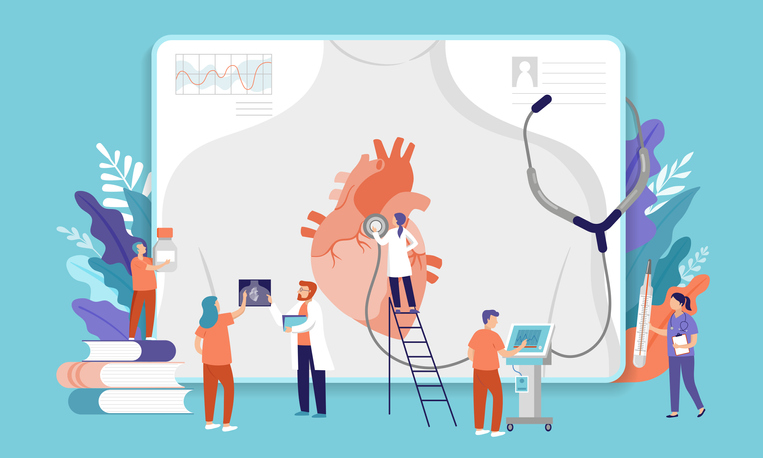Test Your Heart Health In Less Than 2 Minutes & Be Proactive About Preventing Heart Disease

By Joy Stephenson-Laws, J.D., Founder
I will always advocate for the importance of getting routine medical check-ups and examinations from competent medical professionals. But I also believe we should do our part when we can to test ourselves at home. For example, while many of us may have our blood pressure checked at the doctor’s office, we can still practice at-home blood pressure monitoring.
As you may already know, having a healthy blood pressure is important because if blood pressure is too high, for example, this increases the risk of developing hypertension which increases the risk of having heart disease and strokes - two of the leading causes of death among Americans.

But the signs of heart disease and even heart attack are not always so obvious. This is why heart issues are often referred to as “silent killers.”
When you go to the doctor, there are a whole slew of heart tests you may be able to take. For example, an echocardiogram is a common heart test in which sound waves create images of the heart for the doctor to examine. This test shows how the heart is beating and how blood is flowing through the heart.
You can also do a VO2max test which determines your maximal oxygen consumption during intense exercise. This test is usually conducted by an exercise physiologist.
It’s great that technology and advances in medicine provide the opportunity for us to take advantage of such tests that can honestly be life-saving. But the reality is that not everyone goes to a doctor's office and gets the necessary examinations often as they perhaps should. This is especially true as we continue this battle with COVID-19.
There is, however, something quite simple but potentially very effective that you can do at home or outside of a doctor’s office to test the health of your heart.
According to recent research, you can test your heart health by simply climbing up a few flights of stairs.
"The stairs test is an easy way to check your heart health," said Dr. Jesús Peteiro, a cardiologist in Spain who was referenced in this recent Medical Xpress report discussing the research.
"If it takes you more than one and a half minutes to ascend four flights of stairs, your health is suboptimal, and it would be a good idea to consult a doctor.”
Of course, there may be some exceptions. I wouldn’t expect a 95-year-old person with joint issues to be able to do this. But the point is that if you are not elderly or have any specific conditions that disable you physically, then this stair test is something you want to pass. And this isn’t to say that much older people are not capable of passing this test.
Don't panic if you don't pass.As mentioned, if you don’t pass the stair test, it’s probably a good idea to see a doctor. If you are overweight or obese and/or have health conditions that increase your risk of heart disease, such as diabetes, you probably already know that there is plenty of room for improvement when it comes to your heart health.
It is important to note, however, that it is possible to not be overweight but still have suboptimal heart health. This is why it is crucial to assess your ability to climb a few flights of stairs in a certain amount of time and know your body composition.
If you fail the stair test, take this seriously but use it as an opportunity to improve your lifestyle. There is so much within our control, and even the most simple actions can make huge differences.
Here are a few proactive steps you can take:
- Move more. Failed the stair test? Take the initiative to climb more stairs. See if you can steadily improve your time. If stairs are especially difficult for you, try to simply walk more and be less sedentary. Just get moving!
- Don’t smoke. It’s no secret that smoking is terrible for your lungs and can lead to all types of cancer, but I don’t think people always take to heart (pun intended!) how damaging smoking can be to the heart. “The chemicals in tobacco smoke harm your blood cells. They also can damage the function of your heart and the structure and function of your blood vessels. This damage increases your risk of atherosclerosis [the buildup of plaque in the arteries],” according to the National Heart, Lung and Blood Institute (a department of the National Institutes of Health (NIH)).
- Avoid processed and ultra-processed foods as much as possible. Fill your plate with heart-healthy foods such as salmon, leafy greens and avocado.
- Drink alcohol in moderation (if at all). Excessive alcohol consumption can lead to high blood pressure which is bad for heart health. Too much alcohol can also increase inflammation throughout the body, and chronic inflammation is believed by many medical professionals to be the root cause of many different types of disease, including heart disease. And let’s face it, people who drink a lot are often not making heart-healthy activities such as eating healthily and exercising a priority.
- Make sure you are getting adequate amounts of heart-healthy nutrients. Magnesium, potassium and calcium are all very important for heart health. Be sure to take routine nutrient tests in order to definitively determine if you have any nutrient imbalances or deficiencies. If you do, a competent healthcare professional can work with you on making the necessary dietary changes and recommend quality supplements if necessary.
Remember, heart disease is one of the leading causes of death among Americans, but there is so much we can do to change this. Climb your way to better heart health.
Enjoy your healthy life!
Disclaimer: This article is not intended to provide medical advice. Please consult with your doctor or another competent healthcare practitioner to get specific medical advice for your situation.
The pH professional health care team includes recognized experts from a variety of health care and related disciplines, including physicians, attorneys, nutritionists, nurses and certified fitness instructors. This team also includes the members of the pH Medical Advisory Board, which constantly monitors all pH programs, products and services. To learn more about the pH Medical Advisory Board, click here.







